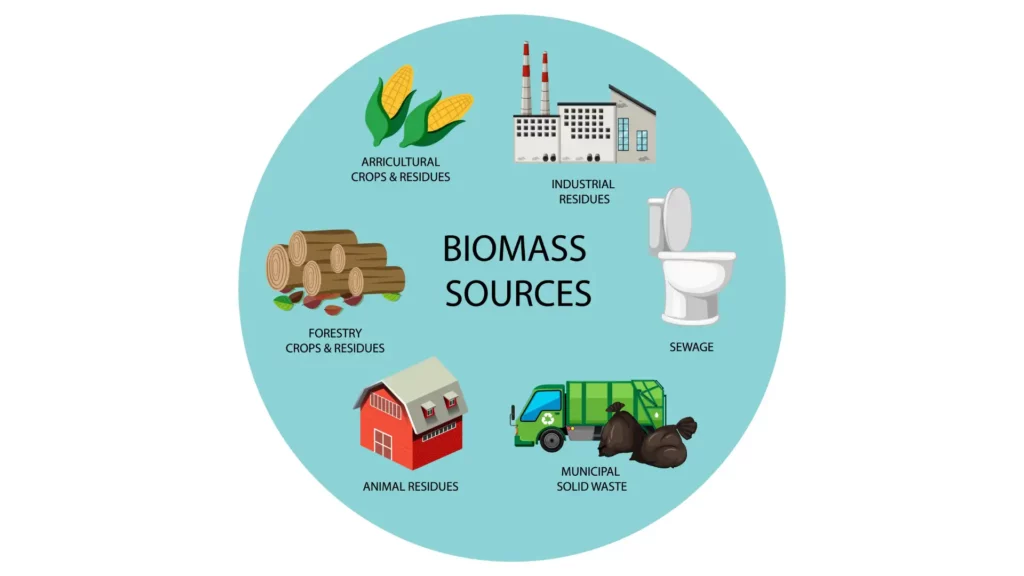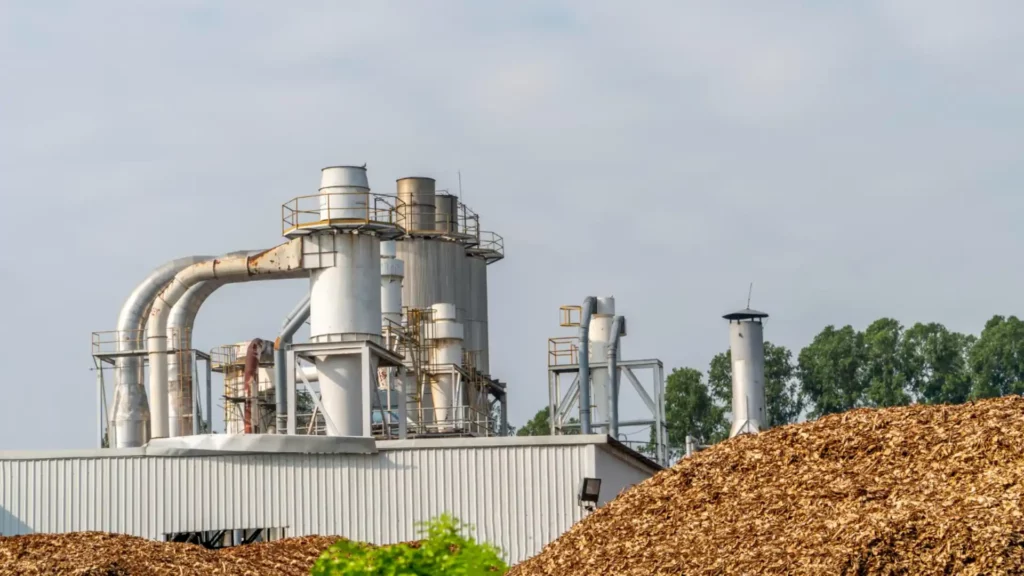In the ever-evolving landscape of renewable energy, biomass energy stands out as a pivotal player. Biomass energy, derived from organic materials such as plant and animal waste, offers a sustainable and eco-friendly alternative to fossil fuels.
As the world gravitates towards greener energy solutions, biomass energy companies are gaining unprecedented attention.
This comprehensive guide delves into the realm of biomass energy companies, exploring their significance, the technologies they employ, and the challenges and opportunities they face.
Understanding Biomass Energy
Biomass energy is harnessed from organic materials, including agricultural residues, forest debris, and waste from plants and animals.
This form of energy is renewable and has a lower carbon footprint compared to traditional fossil fuels.
Biomass energy companies specialize in converting these organic materials into usable energy forms, such as electricity, heat, and biofuels.
The Role of Biomass Energy Companies
Biomass energy companies play a crucial role in the renewable energy sector by providing sustainable alternatives to fossil fuels.
They are at the forefront of developing innovative technologies to efficiently convert biomass into energy, contributing to environmental conservation and energy security.
These companies are also vital for the economy, creating green jobs and supporting rural communities.

Technologies Employed by Biomass Energy Companies
Biomass energy companies utilize a variety of technologies to convert organic waste into energy. These include:
- Direct Combustion: Burning biomass to produce heat. This is one of the most straightforward methods, where organic material is directly burned in furnaces or boilers to generate heat energy, which can then be used to produce steam and generate electricity.
- Gasification: Converting biomass into a gas mixture for electricity generation or as a fuel for engines. During gasification, biomass is transformed into a combustible gas mixture, typically containing carbon monoxide, hydrogen, and methane. This gas can be used to fuel gas turbines or engines, producing electricity or mechanical power.
- Anaerobic Digestion: Breaking down organic material in the absence of oxygen to produce biogas. This process involves microorganisms decomposing biomass in an oxygen-free environment, resulting in the production of methane and carbon dioxide, which can be captured and used as a renewable energy source.
- Pyrolysis: Decomposing organic material at high temperatures in the absence of oxygen to produce bio-oil. Pyrolysis involves heating biomass in the absence of oxygen to break it down into bio-oil, syngas, and biochar.
- Fermentation: Converting organic materials, especially sugars and starches, into bioethanol. This process involves using microorganisms, such as yeast, to ferment the sugars extracted from biomass into ethanol.
- Biodiesel Production: Transforming fats and oils from plants and animals into biodiesel. This involves a chemical process called transesterification, where oils and fats are converted into biodiesel and glycerol.
- Co-firing: Mixing biomass with coal or other fuels in a power plant to produce electricity. Co-firing is a cost-effective way to reduce emissions and increase the renewable energy output of existing fossil fuel power plants.
- Thermal Gasification: A more specific form of gasification that produces syngas through high-temperature processes.
- Combined Heat and Power (CHP): Utilizing the heat generated from biomass energy production. CHP, or cogeneration, is an efficient process that simultaneously generates electricity and useful heat from the same energy source, maximizing the energy yield from biomass.

Top Companies that Use Biomass Energy
The adoption of biomass energy sources is on the rise, with numerous leading companies across various industries integrating this sustainable energy source into their operations.
These companies are not only reaping the environmental benefits but are also enjoying economic and social advantages.
Here's a look at some of the top companies that use biomass energy and the benefits they derive from this renewable energy source.
Drax Group
Industry: Energy Location: United Kingdom
About: Drax Group is a renewable energy company renowned for operating the largest power station in the UK. It has transitioned from coal to become a leader in biomass energy, using sustainable biomass pellets to generate electricity.
Benefits:
- Reduced Carbon Footprint: Drax has significantly lowered its carbon emissions by switching to biomass, contributing to the UK's climate goals.
- Sustainable Energy Supply: By using biomass, Drax ensures a stable and renewable energy supply that is less dependent on fossil fuels.
- Economic Growth: The shift to biomass has created jobs in forestry and logistics, stimulating economic growth in rural areas.
- Enviva
Industry: Forestry and Energy Location: United States
About: Enviva is one of the largest producers of wood pellets, supplying sustainable biomass for power and heat generation worldwide.
Benefits:
- Sustainability: Enviva's biomass is sourced from responsibly managed forests, promoting sustainable forestry practices.
- Renewable Energy Production: The company provides a critical component for generating renewable energy, reducing reliance on coal and natural gas.
- Carbon Neutral Operations: Enviva aims for carbon-neutral production processes, minimizing environmental impact.
E.ON
Industry: Energy Location: Germany
About: E.ON is a leading international energy supplier focusing on smart grids, renewable energy, and customer solutions, including biomass energy projects.
Benefits:
- Diverse Energy Mix: Incorporating biomass into its energy mix allows E.ON to offer more sustainable and diverse energy solutions to its customers.
- Innovation: E.ON invests in innovative biomass technologies, leading to more efficient energy production and reduced waste.
- Community Support: Biomass projects often support local communities by providing jobs and utilizing local resources, reducing waste and promoting sustainability.
Abengoa Bioenergy
Industry: Bioenergy Location: Spain
About: Abengoa Bioenergy is a leading company in the development of new technologies for producing biofuels and bioenergy from biomass, making it a key player in the bioenergy sector.
Benefits
- Advanced Biofuel Production: The company's focus on second-generation biofuels reduces competition for food resources and utilizes waste materials.
- Global Reach: Abengoa's operations contribute to the global availability of renewable energy, reducing global carbon emissions.
- R&D Investment: Significant investment in research and development promotes innovation in biomass conversion technologies, improving efficiency and sustainability.

Key Players in the Biomass Energy Sector
The biomass energy sector is populated with numerous companies, ranging from startups to established multinational corporations.
These biomass energy companies are engaged in various aspects of biomass energy production, including raw material sourcing, technology development, energy production, and distribution.
Opportunities for Biomass Energy Companies
The global push towards renewable energy opens up numerous opportunities for biomass energy companies:
- Innovation in Technology: Advancements in conversion technologies can enhance efficiency and reduce costs.
- Expansion into New Markets: Growing demand for renewable energy in developing countries offers new markets.
- Partnerships with Governments and Industries: Collaborations can provide access to funding, incentives, and feedstock.
- Contribution to Carbon Neutrality: Biomass energy companies are integral to achieving global carbon neutrality goals.
- Diversification of Product Lines: By developing a range of bioenergy products such as biofuels, biopower, and bioproducts, biomass energy companies can cater to a broader market and increase their revenue streams.
- Waste Management Solutions: Leveraging biomass energy as a solution for organic waste management can open up new business models and partnerships with municipal and industrial sectors.
- Carbon Credit Trading: Participating in carbon credit markets by showcasing biomass energy's role in reducing carbon emissions can provide an additional revenue stream and enhance environmental credentials.

Environmental Impact and Sustainability of Biomass Energy Companies
- Central Role in Renewable Energy Transition: Biomass energy companies are fundamental to shifting away from fossil fuels towards more sustainable energy sources, marking a pivotal step in the global renewable energy transition.
- Sustainability Solutions: They offer sustainable energy solutions by transforming organic waste materials into energy, thereby contributing to environmental conservation and sustainability goals.
- Reduction in Landfill Use: By utilizing organic waste that would otherwise end up in landfills, biomass energy companies significantly reduce the amount of waste disposed of in these environments.
- Lowering Greenhouse Gas Emissions: The process of converting biomass into energy typically results in lower greenhouse gas emissions compared to the burning of fossil fuels, helping to mitigate climate change.
- Promotion of the Circular Economy: Biomass energy companies are key players in promoting the circular economy by recycling waste into energy, thus supporting a system that aims for the elimination of waste and the continual use of resources.
- Responsible Sourcing of Biomass: To ensure that biomass energy remains a green option, these companies must source biomass responsibly, avoiding the depletion of natural resources or harm to ecosystems

Investing in Biomass Energy: A Closer Look at Biomass Energy Stocks
In the realm of sustainable investments, biomass energy stocks are emerging as a compelling option for eco-conscious investors.
As the global economy continues to shift towards renewable energy sources, the interest in biomass energy stocks has seen a significant uptick.
These stocks represent companies involved in the production and innovation of biomass energy, ranging from the cultivation of biomass feedstocks to the technology behind converting these organic materials into energy.
Investing in biomass energy stocks offers financial returns and supports the transition to sustainable energy. This makes it an attractive investment for a diverse portfolio, with promising prospects as demand for renewable energy grows.

Future Prospects for Biomass Energy Companies
- Accelerated Global Shift Towards Renewable Energy
As global awareness and governmental policies increasingly favor renewable over fossil fuels, biomass energy companies are positioned at the forefront of this transformative shift.
Their role in providing sustainable energy solutions is becoming more critical in the context of global energy policies aiming to reduce carbon emissions and combat climate change.
- Technological Advancements in Biomass Conversion
The growth of biomass energy companies relies on technological advancements improving the efficiency, affordability, and environmental friendliness of biomass conversion processes like gasification, pyrolysis, and anaerobic digestion.
These innovations increase energy yields and allow for a wider range of feedstock, expanding biomass energy solutions.
- Increased Governmental Support and Incentive Programs
Governments worldwide are increasingly recognizing the importance of biomass energy in achieving their renewable energy targets and are therefore likely to bolster their support.
This support may come in the form of subsidies, tax incentives, and favorable regulatory frameworks designed to stimulate investment in biomass energy projects, research and development, and infrastructure.
- Growing Awareness and Demand for Sustainable Energy
Public and corporate awareness regarding the urgent need to shift towards more sustainable energy sources is at an all-time high.
This consciousness is driving demand for renewable energy, including biomass, as stakeholders across the spectrum seek to reduce their carbon footprint and enhance their sustainability credentials.
Biomass energy companies stand to benefit significantly from this trend as they offer a tangible solution to these demands.
- Expansion into Emerging Markets
Emerging economies represent a significant growth opportunity for biomass energy companies. These regions often have abundant biomass resources and an urgent need for sustainable energy solutions to power their development.
The expansion into these markets is facilitated by the global nature of the climate crisis and the international push towards renewables, offering a ripe environment for biomass energy companies to grow and diversify their operations.
- Collaboration with Other Renewable Energy Sectors
The future will likely see increased collaboration between biomass energy companies and other sectors within the renewable energy industry.
By integrating biomass energy systems with solar, wind, and hydroelectric power operations, companies can create more stable and efficient energy grids that leverage the strengths of each renewable resource.

Biomass Energy Companies Frequently Asked Questions (FAQs)
1. What services does Biomass Energy Corporation offer?
Biomass Energy Corporation specializes in converting organic waste into renewable energy, providing sustainable energy solutions to various sectors. Their services range from project development and management to the production and supply of biomass-derived energy. This corporation plays a crucial role in promoting biomass as a viable renewable energy source, focusing on innovation and sustainability.
2. How do biomass energy producers contribute to environmental sustainability?
Biomass energy producers are instrumental in reducing reliance on fossil fuels by converting organic materials into energy. They utilize sustainable practices to harvest biomass, ensuring that their operations contribute to the reduction of greenhouse gas emissions and the promotion of a circular economy. By doing so, biomass energy producers not only generate renewable energy but also help in mitigating climate change.
3. Can Biomass Energy Renewables LLP customize energy solutions for different industries?
Yes, Biomass Energy Renewables LLP is known for its ability to tailor energy solutions to meet the specific needs of various industries. They assess the unique requirements of each client to provide optimized biomass-based energy systems. Their expertise lies in designing, implementing, and managing biomass energy projects, ensuring efficient and sustainable energy production for their clients.
4. What makes biomass renewable energy companies different from other renewable energy providers?
Biomass renewable energy companies stand out for their use of organic waste materials to produce energy, which not only provides a renewable source of power but also helps in waste reduction. Unlike other renewable energy sources that rely on natural phenomena like sun or wind, biomass energy can be produced consistently, offering a stable and reliable energy supply while contributing to waste management and carbon emission reduction.
5. Why choose Florida Biomass Energy LLC for your energy needs?
Florida Biomass Energy LLC is a leader in the biomass energy sector, offering cutting-edge solutions for converting biomass into clean energy. Their commitment to innovation and sustainability makes them a preferred choice for businesses and communities looking to reduce their environmental impact. With a focus on customer satisfaction and environmental stewardship, Florida Biomass Energy LLC provides reliable, eco-friendly energy solutions tailored to the unique needs of their clients.
6. Are the services offered by biomass energy corporations cost-effective compared to traditional energy sources?
Biomass energy corporations, including Florida Biomass Energy LLC and Biomass Energy Renewables LLP, offer competitive and often cost-effective energy solutions compared to traditional fossil fuels. The initial investment in biomass energy systems can be offset by the long-term savings on energy costs and potential government incentives for renewable energy use. Moreover, the environmental benefits of reducing carbon footprint and contributing to waste reduction add significant value beyond mere cost savings.
Biomass Energy Companies Conclusion
Biomass energy companies are pivotal in the global transition to renewable energy, offering sustainable and eco-friendly alternatives to fossil fuels.
Despite facing challenges such as supply chain logistics and technological barriers, the opportunities for growth and innovation are vast.
As the world increasingly recognizes the importance of sustainable energy, biomass energy companies are set to play a crucial role in shaping a greener, more sustainable future.
Source
https://tedb.ornl.gov/wp-content/uploads/2019/04/Biomass_Energy_Data_Book_Edition_3.pdf

